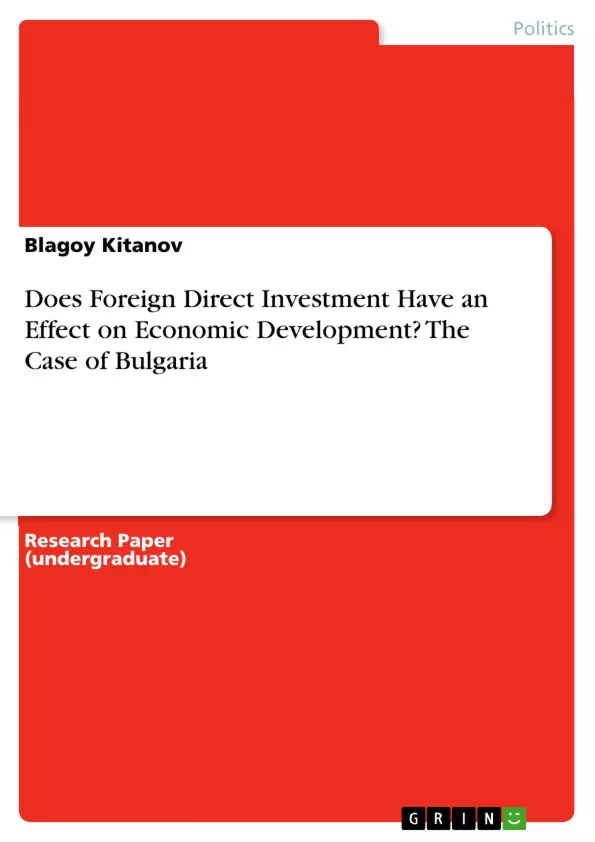There is a big amount of literature in the recent decades about the broad effect of foreign direct investment (FDI) on the development of the recipient country. Interestingly, policy-making has come to ignore the ambiguous and inconclusive academic research results in terms of the benefits and costs of FDI. Almost every country nowadays strives to attract foreign investment most probably due to the success stories of some countries that have achieved rapid economic growth after encouraging FDI (China, Ireland, Hungary, Czech Republic). It is beyond doubt that transnational corporations (TNCs) possess much of the world’s stock of technological knowledge and are productively using it. However, it is not so obvious whether the host countries can benefit from that knowledge.
Inhaltsverzeichnis (Table of Contents)
- Introduction
- A Quick Overview of the Bulgarian Transition Process
- Impacts of Inward FDI in Transitional Economies: A Theoretical Framework
- Spillover Effects: Empirical Evidence
- Influence of FDI on Growth in Bulgaria: Empirical Evidence
Zielsetzung und Themenschwerpunkte (Objectives and Key Themes)
This paper examines the impact of foreign direct investment (FDI) on the economic development of post-communist Bulgaria, arguing that the significance of FDI's effect depends on the sectors receiving foreign capital. It aims to analyze the role of FDI in Bulgaria's transition process and assess the contribution of FDI to economic growth. It will utilize the concept of "absorption capacity" to explain the conditions under which spillover effects from FDI occur.
- The impact of FDI on the economic development of post-communist Bulgaria.
- The role of FDI in Bulgaria's transition process.
- The significance of sectoral allocation of FDI.
- The concept of "absorption capacity" and its influence on spillover effects from FDI.
- The relationship between FDI and economic growth in Bulgaria.
Zusammenfassung der Kapitel (Chapter Summaries)
- Introduction: The paper sets the stage by discussing the inconclusive research on the effects of FDI, highlighting the importance of sector-specific analysis. It introduces the main thesis: FDI's impact on economic development depends on the sectors receiving investment.
- A Quick Overview of the Bulgarian Transition Process: This chapter provides context by outlining Bulgaria's economic transition from 1990 to 1997, emphasizing the challenges faced due to economic instability and inefficient reforms. The chapter highlights the crucial role of the currency board introduction in 1997 in creating a business environment conducive to FDI.
- Impacts of Inward FDI in Transitional Economies: A Theoretical Framework: This section explores the theoretical framework for analyzing FDI's impact on host economies. It discusses the effects of FDI on state-owned firms, highlighting the advantages of foreign ownership in stimulating transition. Additionally, the chapter delves into spillover effects of FDI, examining their potential positive and negative influences on product, capital, and labor markets.
- Spillover Effects: Empirical Evidence: The chapter analyzes empirical evidence regarding the impact of FDI on productivity and spillover effects. It differentiates between horizontal and vertical spillover effects, discussing the conditions required for positive horizontal spillovers. The importance of institutional infrastructure in attracting FDI is emphasized, and the case of Bulgaria's lagging behind due to delayed reforms and an unfavorable business climate is examined.
Schlüsselwörter (Keywords)
The main keywords and focus topics of the text include foreign direct investment, economic development, transition process, absorption capacity, spillover effects, horizontal and vertical spillovers, institutional infrastructure, Bulgaria, post-communist economies, and macroeconomic effects.
Frequently Asked Questions
How does FDI affect economic development in Bulgaria?
FDI's impact in Bulgaria is significant but depends heavily on the specific sectors receiving the capital. It has played a crucial role in the country's transition from a planned to a market economy.
What is "absorption capacity" in the context of FDI?
Absorption capacity refers to the ability of a host country's domestic firms to recognize, assimilate, and apply new knowledge and technology brought in by foreign investors.
What are horizontal and vertical spillover effects?
Horizontal spillovers occur between firms in the same industry (e.g., through competition), while vertical spillovers happen between foreign firms and their local suppliers or customers.
Why did Bulgaria lag behind in attracting FDI initially?
Delayed reforms, economic instability between 1990 and 1997, and an unfavorable business climate hindered early investment until the introduction of the currency board in 1997.
What role did transnational corporations (TNCs) play?
TNCs brought essential technological knowledge and productive efficiency to Bulgaria, helping to modernize state-owned enterprises during the privatization process.
- Citation du texte
- Blagoy Kitanov (Auteur), 2009, Does Foreign Direct Investment Have an Effect on Economic Development? The Case of Bulgaria, Munich, GRIN Verlag, https://www.grin.com/document/155142



